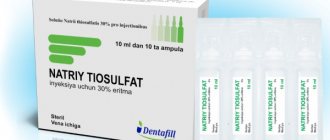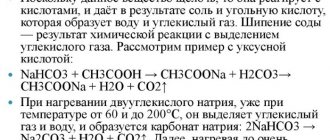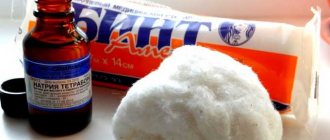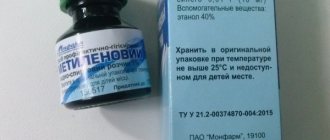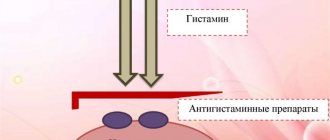Prohibited during pregnancy
Prohibited during breastfeeding
Has restrictions for children
Has limitations for liver problems
Has limitations for kidney problems
Sodium hydroxybutyrate (gamma-hydroxybutyrate, gamma-hydroxybutyrate, GHB, sodium oxybate) - chemically it is the sodium salt of gamma-hydroxybutyric acid. Physical properties: white (there may be a yellowish tint), powder with a slight odor, soluble in alcohol and water.
It is a natural metabolite in the human body. Found in the highest concentrations in the hypothalamus, basal ganglia, kidneys, and myocardium. It is on the list of vital and essential medications as a medicine for intravenous anesthesia.
Pharmacodynamics and pharmacokinetics
Sodium Hydroxybutyrate is characterized by interaction with various receptors, influencing the functions of Ca2+, K+ and other channels. As a result, the release of activating mediators from presynaptic terminals is suppressed and postsynaptic inhibition occurs. The drug has a depressant effect on the nervous system.
When taking small doses, an anxiolytic effect appears, the severity of neurotic disorders and some autonomic reactions to stress decreases. The hypnotic effect of the drug has also been noticed
Large doses of the drug are used for general anesthesia and muscle relaxation . In addition, a sedative, muscle relaxant, anticonvulsant and antishock effect is manifested. The development of elements of nootropic activity is possible.
During treatment, the overall resistance of the body, brain, heart, and other organs to oxygen deficiency increases. There was an improvement in microcirculation, an increase in glomerular filtration, and normalization of kidney function during blood loss.
It has been established that the substance penetrates histohematic barriers.
According to Wikipedia, the drug is currently discontinued.
Use of the drug in medicine
In world medical practice, Oxybate is used in different countries for various purposes:
- In Italy, the psychoactive substance sodium oxybutyrate is used to treat alcohol dependence and relieve withdrawal symptoms.
- In the United States, the FDA has approved its use for the treatment of severe daytime sleepiness caused by narcolepsy.
- The Therapeutic Products Agencies of Switzerland and Europe, the American Academy of Sleep Medicine, and the Canadian Ministry of Health have also approved the use of Oxybutyrate for the treatment of cataplexy that develops against the background of narcolepsy.
- In Russia, sodium oxybutyrate is used in patients with a history of neurosis-like and neurotic conditions, and this medicinal psychotropic drug is prescribed to patients with traumatic injuries to the central nervous system and various degrees of intoxication.
The pharmacological effect of sodium oxybate is to enhance the metabolism of cardiac and brain tissues, the retina, as well as increase their resistance to hypoxia (oxygen starvation). In addition, the drug, which in recent years has become an object of desire for young drug addicts, can stabilize kidney function in case of significant blood loss and normalize the contraction of the heart muscle. Most often, Butyrate is used in several areas of medicine:
- In obstetrics to increase the resistance of the fetus and mother to oxygen starvation, general anesthesia during emergency childbirth, and for the rest of the woman in labor during a prolonged labor.
- In ophthalmology, for the treatment of patients with a history of primary open-angle glaucoma, in order to activate oxidative processes in the retina and improve vision as a result.
- In surgery, the narcotic substance sodium oxybutyrate is used as a long-acting anesthesia. Patients are rendered unconscious using this product when non-strip surgery in obstetrics and gynecology is required, as well as cardiac surgery or surgery related to minor injuries.
In addition, active research is underway on the possibility of using sodium oxybate for the treatment of tremors and movement disorders, psychogenic overeating, chronic fatigue syndrome, chronic cluster headaches, schizophrenic disorders and Parkinson's disease.
Indications for use
The use of Sodium Hydroxybutyrate is indicated in the treatment of:
- glaucoma;
- neurotic disorders;
- sleep disorders;
- postoperative psychosis;
- severe hypoxic conditions.
In addition, the drug is used in surgical practice as an induction of anesthesia during non-cavitary operations, maintaining spontaneous breathing.
Possible side effects and overdose
The drug quite often causes the following reactions in the body:
dizziness, nausea;- sleep disorders (insomnia, drowsiness, somnambulism);
- headache;
- photophobia;
- tremor;
- hallucinations;
- hypokalemia;
- With rapid administration, convulsive muscle contractions are possible.
Overdose is expressed as follows:
- dizziness, nausea, vomiting;
- euphoria, increased libido, psychomotor agitation;
- involuntary urination and defecation;
- hallucinations, impaired consciousness, disorientation;
- retrograde amnesia;
- If the dose is significantly exceeded and/or combined with alcohol, tranquilizers, or antidepressants, respiratory arrest and death may occur.
Sodium hydroxybutyrate, instructions for use (Method and dosage)
This drug can be used for intravenous and intramuscular administration, as well as oral administration.
When general anesthesia is necessary, the medicine is injected into the vein especially slowly, no more than 1-2 ml per minute. When maintaining anesthesia, an additional 40 mg per kg of weight is prescribed. For induction of anesthesia, small patients are prescribed 100 mg per kg of body weight with the addition of glucose solution in frequent drops over 5-10 minutes.
The dosage for intramuscular administration is 120-150 mg per kg of weight.
For oral administration, adult patients are prescribed 100-200 mg per kg of weight, children - up to 150 mg/kg.
Release form and composition
The following dosage forms of Sodium hydroxybutyrate are produced:
- Solution for intravenous administration 20% (in ampoules of 10 ml; 10 ampoules complete with an ampoule knife in a package);
- Concentrate for the preparation of a solution for oral administration 66.7% (in bottles of 37.5 ml, 1 bottle in a cardboard pack);
- Syrup 5% (in bottles of 400 ml);
- Powder substance (0.5 or 2 kg jar; 3, 5 or 15 kg bag (for hospitals)).
Active ingredient in all forms of release: sodium salt of g-hydroxybutyric acid.
Analogs
Level 4 ATC code matches: Calypsol
Diprivan
Nitrous oxide
Propofol
Ketamine
The main analogues are represented by the following drugs: Sodium Oxybate, Ketamine, Thiopental sodium, Droperidol and Sombrevin.
Drug butyrate: effects, action
The effect of butyrate enhances the effects of other drugs and painkillers, while the substance itself does not have a sedative or psychostimulant effect. The effects begin to appear 15-20 minutes after administration, and last on average an hour or two hours, in some cases longer. In a small dose, butyrate causes relaxation, uplifting, a feeling of euphoria, and a desire to communicate a lot. The condition resembles alcohol intoxication without the hangover effect. Therefore, many often do not want to stop at the first dose and continue to take butyrate, as a result they become addicted to the substance. With an average dose, relaxation of the whole body and confusion of speech occur, and you want to dance. Sometimes nausea is possible. Increasing the dose results in deep sleep for several hours. After a couple of uses, the concentration of the drug in the liver reaches a critical value, the body is unable to cope with large amounts of toxins and an inhibition reaction begins. Constant drowsiness, inability to get enough sleep, apathy and indifference to others - all this is a negative reaction of inhibition. A stereotype is imposed on young people that butyrate helps them feel spontaneous and free, overcome communication complexes, and lifts their spirits. To some extent, this is true, sodium hydroxybutyrate removes barriers, but barriers of decency, a person simply loses control, begins to behave thoughtlessly and stupidly. With constant drug use, personal degradation quickly develops. A person becomes aggressive and commits inappropriate actions that he would not have dared to do in a normal state. For example, stories of walking or jogging in the nude are not uncommon. Memory lapses are possible. Nine times out of ten, when using butyrate with alcohol, unexpected results occur instead of a positive effect. At the same time, it is easy not to calculate the required dose, if the first time a person does not get the expected effect in the form of euphoria due to a weak solution, perhaps next time he will receive a real concentration, which may well lead to painful death.
Reviews for Sodium Oxybutyrate
It should be noted that discussions of this drug are often found on various medical forums. However, reviews of Sodium Hydroxybutyrate in most cases are not related to its effectiveness, but to its use for a completely different purpose.
For example, some users report using this medication as a substitute for alcohol, which helps them relax and take their mind off problems. But as it turns out, people quickly get used to it, and the consequences are even worse than from alcohol addiction.
In addition, there are many questions regarding the features of using this tool. They are interested in whether it is possible to use Sodium Oxybutyrate at home, where it can be purchased, and also what dosages are allowed for treatment in certain cases.
But, as it turned out, this medicine is no longer produced, so it is not used in medical practice.
Features of Butyrate, its properties and production
The main adherents of this pharmaceutical psychotropic are young people aged 14-23 years. “Oxic” has gained popularity among this age category not only for its availability and low cost, but also for a number of abilities and capabilities:
- to lift the mood, for which it was given the slang name “dance-water”;
- force you to be relaxed in communication, which allows you to make fun of a modest friend by filming him on your phone at this time;
- stimulate physical and mental activity - a student taking Butyrate during the session can prepare for exams without rest;
- increase libido - a young man who quietly mixed the narcotic substance sodium oxybutyrate into the drink of an intractable girl will have no problem “seducing” her into any sexual relationship.
Butyrate is a normal element of metabolism occurring in the human brain. It is considered a neurotransmitter (a biologically active substance that transmits nerve impulses), although it does not fully satisfy the requirements that are placed on them.
The chemical properties possessed by the substance Sodium oxybutyrate are characteristic of short-chain fatty acids. For example, when it interacts with alcohols, an ester formation reaction occurs. Butyrate is highly soluble in water, alcohol-containing liquids and organic oxidizing agents. A synthetic salt is obtained, which is a complete analogue of GABA, a natural brain metabolite, through alkaline hydrolysis of butyrolactone.
How to stop drinking butyrate?
Painful cravings for butyrate require treatment with the participation of qualified specialists. In order for the patient to receive help, his consent to the procedures and a conscious desire to get rid of addiction are required. Important: The distribution of this psychoactive drug on the territory of the Russian Federation has been prohibited since 1997. The main task of narcologists is to accelerate the detoxification of the body and remove it from a kind of “binge”. At the next stage of therapy, psychotherapists eliminate mental dependence, creating a goal of returning to a normal lifestyle.
The longest and most difficult phase of treatment is rehabilitation. During this period, the patient needs the full support of family and friends. Doctors will help you decide how to “get off” butyrate and will do everything possible to ensure that you or your relative returns to a normal healthy life!
The text was checked by expert doctors:
Head of the socio-psychological service of the Alkoklinik MC, psychologist Yu.P. Baranova, L.A. Serova, a psychiatrist-narcologist.
CAN'T FIND THE ANSWER?
Consult a specialist
Or call: +7 (495) 744-85-28
Call! We work around the clock!
Signs of butyrate use
The characteristic symptoms of butyrate use will depend primarily on the dosage:
- A small dose of up to one and a half grams - a person behaves unusually relaxed, he is in a great mood and euphoria.
- The average dose is up to 2.5 grams - in this case, you can hear incoherent speech and clouding of consciousness.
- A large dose of up to 3 grams - vomiting and nausea, inability to control bowel movements, impaired mental state. Dosage above 5 grams causes coma.
If the drug is used for a long time, the result can be serious brain damage.
In combination with other substances
The drug becomes triple dangerous if combined with other substances.
Butyrate with alcohol
Alcoholic drinks and butyrate have a similar effect - depression of the nervous system. If you combine them, the risk of memory loss, inappropriate behavior, vomiting and coma increases. Deaths are also not uncommon, especially when a drug addict loses control over the amount of alcohol he drinks.
Butyrate and amphetamine
In addition to poisoning, this combination almost always leads to hallucinations and loss of orientation in space.
How long does it take for butyrate to be excreted from the body?
The rate at which the drug is eliminated from the body depends primarily on the duration of use. Butyrate tends to accumulate in the kidneys and liver.
How long does it stay in the blood?
The period of complete elimination from the blood is about 6 days. If a person has been taking the drug for a long time and regularly, this period may increase by a couple of days.
How long does it stay in urine?
Butyrate can be detected in urine a week after administration. However, standard tests may not show drug residues within 24 hours after ingestion. This makes diagnosis difficult.
Butyrate test
The test is carried out exclusively in the clinic, and it is important that no more than six hours have passed since the intended moment of use.
Figure: Effects of butyrate
Similar drugs:
- Sodium oxybate Solution for intravenous and intramuscular administration
- Halothane Inhalation aerosol
- Propofol Lipuro Emulsion for infusion
- Calypsol Injection solution
- Ketalar Solution for intravenous and intramuscular administration
- Sodium oxybutyrate Substance-powder
- Ketanest Solution for intravenous and intramuscular administration
- Propovan Emulsion for infusion
- Thiopental Lyophilisate for the preparation of solution for intravenous administration
- Propofol Kabi Emulsion for infusion
** The Drug Directory is intended for informational purposes only. For more complete information, please refer to the manufacturer's instructions. Do not self-medicate; Before starting to use the drug Sodium hydroxybutyrate, you should consult a doctor. EUROLAB is not responsible for the consequences caused by the use of information posted on the portal. Any information on the site does not replace medical advice and cannot serve as a guarantee of the positive effect of the drug.
Are you interested in the drug Sodium hydroxybutyrate? Do you want to know more detailed information or do you need a doctor's examination? Or do you need an inspection? You can make an appointment with a doctor - the Euro lab is always at your service! The best doctors will examine you, advise you, provide the necessary assistance and make a diagnosis. You can also call a doctor at home . Euro lab clinic is open for you around the clock.
** Attention! The information presented in this medication guide is intended for medical professionals and should not be used as a basis for self-medication. The description of the drug Sodium hydroxybutyrate is provided for informational purposes and is not intended for prescribing treatment without the participation of a doctor. Patients need to consult a specialist!
If you are interested in any other drugs and medications, their descriptions and instructions for use, information about the composition and form of release, indications for use and side effects, methods of use, prices and reviews of drugs, or you have any other questions and suggestions - write to us, we will definitely try to help you.
Types of buterate
The drug is sold primarily in liquid form. However, it can be diluted with water or alcohol. Few, especially brave people, dare to administer the drug intravenously, due to the extremely difficult state of the “advance”. The substance has many different names.
Drug water
Sodium butyrate has the appearance of water. At the same time, a relatively high-quality drug should not have a strong solvent odor.
Drug Oksana
The substance received this name from its official name - sodium hydroxybutyrate.
Drug Pinocchio
This slang name for the drug arose for a reason - a person under the “butter” becomes as intellectual as a log. Just watch a video of people's behavior under the influence of this drug.
Butyrate addiction
Persistent addiction to the drug develops after 3 doses. Withdrawal when stopping use is almost equal in severity to heroin.
Stages of formation
At the first stage, a person takes butyrate to get a good mood and more vivid sensations during sex. After the end of the effect of the substance, symptoms similar to a hangover are felt - headache, nausea, vomiting. As soon as they pass, there is a craving to experience the high from the drug again. At this stage, it is still possible to quit using.
The second stage is characterized by a decrease in the effect of butyrate and a more severe withdrawal syndrome. Euphoria gives way to a tense state.
At the third stage, a person experiences virtually no pleasant sensations when taking the drug, and withdrawal becomes more and more severe. Butyrate is taken to relieve terrible symptoms. When used, there is a complete loss of consciousness or clouding of reason, speech becomes unintelligible.
Overdose
Exceeding the dose causes the following symptoms:
- Vomiting, nausea, diarrhea, uncontrolled urination;
- convulsions;
- tremor of the limbs;
- sudden surges in pressure;
- increased body temperature;
- pale skin;
- the pulse is practically not palpable;
- complete loss of consciousness.
It is necessary to urgently call an ambulance; before they arrive, if a person is vomiting, turn him on his side. Do not give water or medicine.
Withdrawal from butyrate
The symptoms of withdrawal are similar to an alcohol hangover at the initial stage of addiction - vomiting and nausea, headache, shaking hands, chills. With regular use, the addict experiences muscle pain, hallucinations, and sudden surges in blood pressure begin.

